International Trade and Poverty Reduction: Nigeria Case Study
VerifiedAdded on 2020/11/12
|16
|5585
|104
Report
AI Summary
This report provides a comprehensive analysis of the relationship between international trade and poverty reduction in Nigeria. It begins with an introduction outlining the context of rising poverty and the role of international trade, followed by a background section that identifies relevant issues such as poor education, corruption, and economic infrastructure. The report then delves into peer-reviewed literature, exploring relevant theories like the Value Exchange Business Model, and examines the concept of international trade, measures to minimize poverty, and the role of trade in reducing poverty. A critical analysis of the literature is presented, followed by a bibliography. The study investigates Nigeria's economic situation, its GDP, and the impact of governmental issues and unemployment, and also highlights the strong export sector. The report aims to determine the concept of international trade, identify measures to minimize poverty in Nigeria, and evaluate the role of trade in poverty reduction. The justification for the investigation emphasizes Nigeria's economic challenges and the need for strategies to attract multinational companies. The research focuses on ethical norms and authentic articles. The report concludes by summarizing the key findings and implications for Nigeria's economic development.
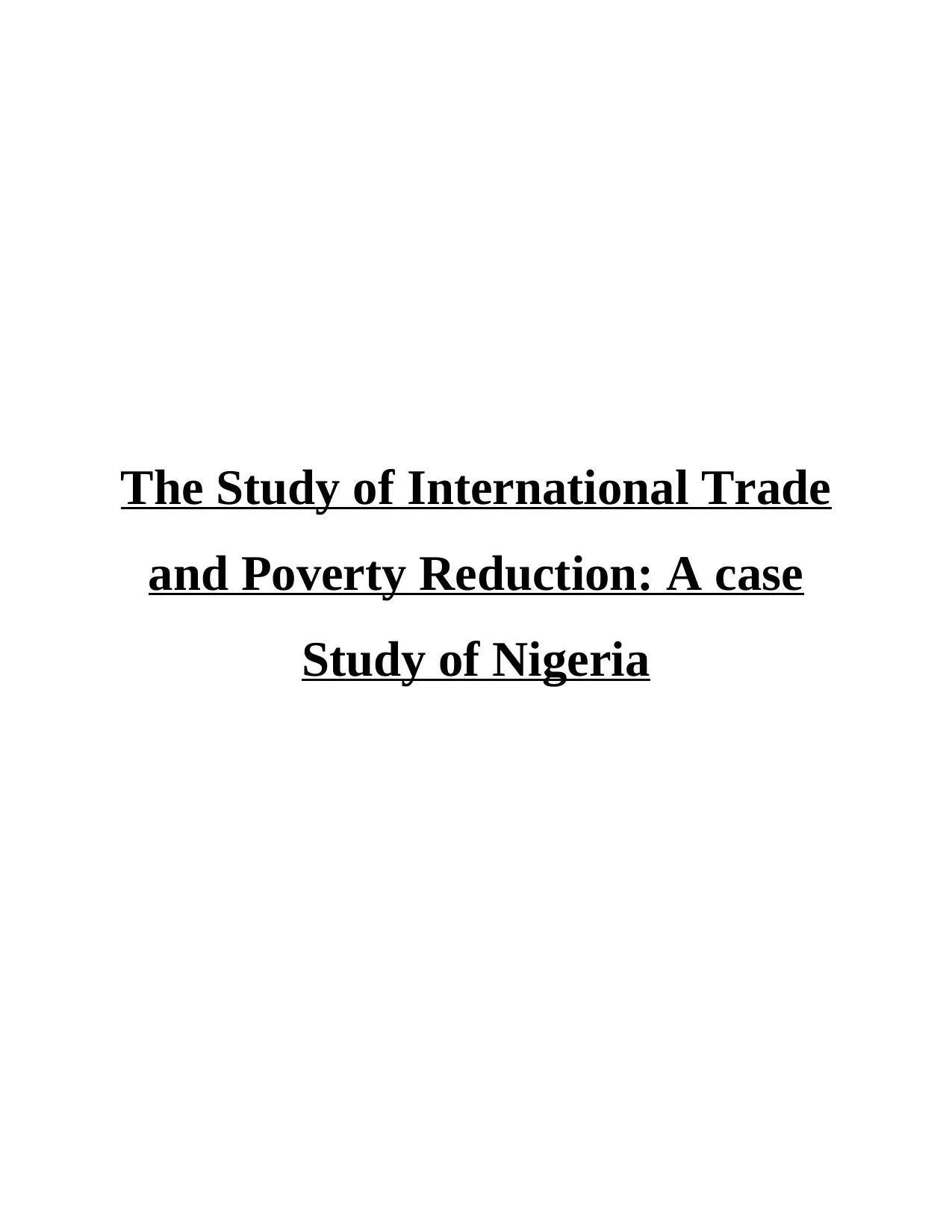
The Study of International Trade
and Poverty Reduction: A case
Study of Nigeria
and Poverty Reduction: A case
Study of Nigeria
Paraphrase This Document
Need a fresh take? Get an instant paraphrase of this document with our AI Paraphraser
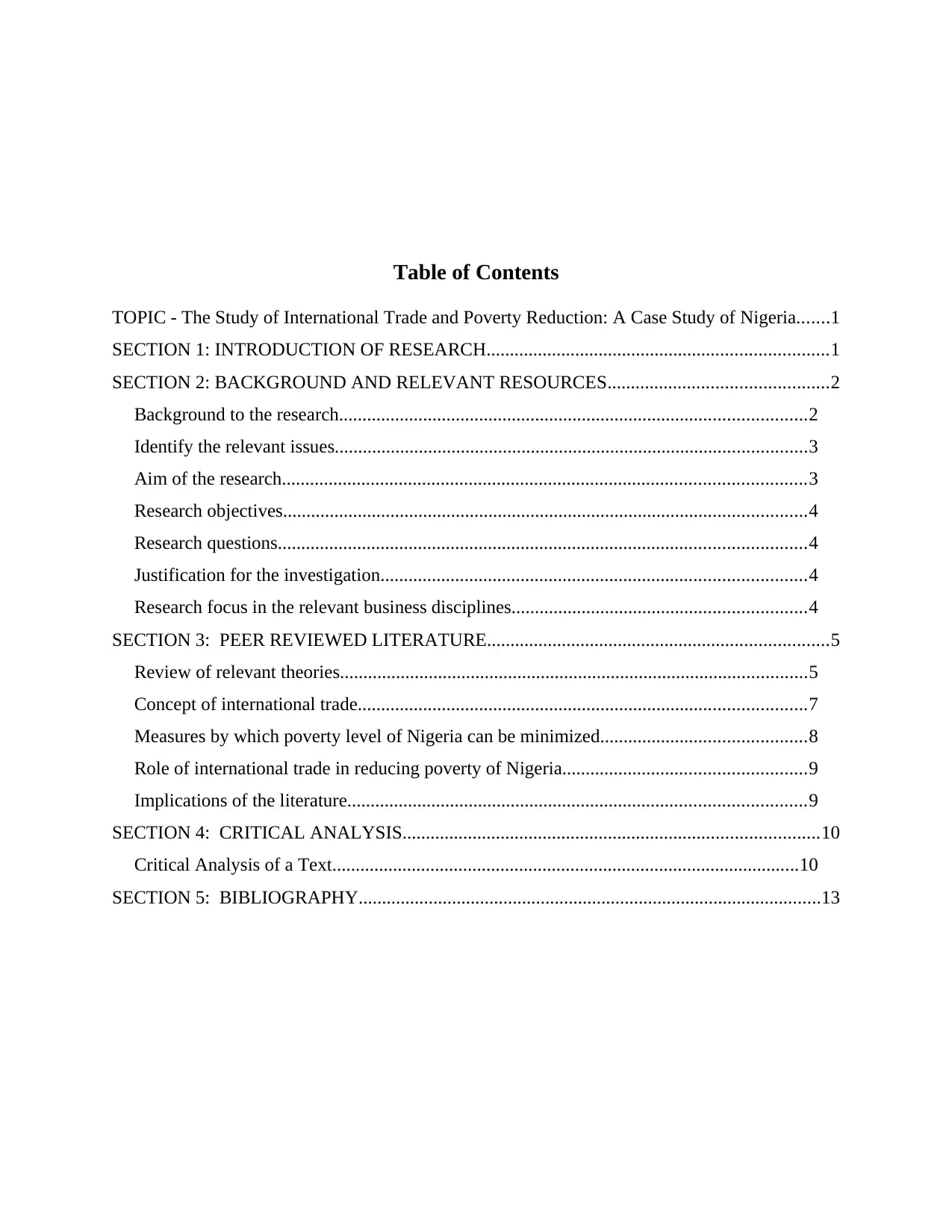
Table of Contents
TOPIC - The Study of International Trade and Poverty Reduction: A Case Study of Nigeria.......1
SECTION 1: INTRODUCTION OF RESEARCH.........................................................................1
SECTION 2: BACKGROUND AND RELEVANT RESOURCES...............................................2
Background to the research....................................................................................................2
Identify the relevant issues.....................................................................................................3
Aim of the research................................................................................................................3
Research objectives................................................................................................................4
Research questions.................................................................................................................4
Justification for the investigation...........................................................................................4
Research focus in the relevant business disciplines...............................................................4
SECTION 3: PEER REVIEWED LITERATURE.........................................................................5
Review of relevant theories....................................................................................................5
Concept of international trade................................................................................................7
Measures by which poverty level of Nigeria can be minimized............................................8
Role of international trade in reducing poverty of Nigeria....................................................9
Implications of the literature..................................................................................................9
SECTION 4: CRITICAL ANALYSIS.........................................................................................10
Critical Analysis of a Text....................................................................................................10
SECTION 5: BIBLIOGRAPHY...................................................................................................13
TOPIC - The Study of International Trade and Poverty Reduction: A Case Study of Nigeria.......1
SECTION 1: INTRODUCTION OF RESEARCH.........................................................................1
SECTION 2: BACKGROUND AND RELEVANT RESOURCES...............................................2
Background to the research....................................................................................................2
Identify the relevant issues.....................................................................................................3
Aim of the research................................................................................................................3
Research objectives................................................................................................................4
Research questions.................................................................................................................4
Justification for the investigation...........................................................................................4
Research focus in the relevant business disciplines...............................................................4
SECTION 3: PEER REVIEWED LITERATURE.........................................................................5
Review of relevant theories....................................................................................................5
Concept of international trade................................................................................................7
Measures by which poverty level of Nigeria can be minimized............................................8
Role of international trade in reducing poverty of Nigeria....................................................9
Implications of the literature..................................................................................................9
SECTION 4: CRITICAL ANALYSIS.........................................................................................10
Critical Analysis of a Text....................................................................................................10
SECTION 5: BIBLIOGRAPHY...................................................................................................13

⊘ This is a preview!⊘
Do you want full access?
Subscribe today to unlock all pages.

Trusted by 1+ million students worldwide
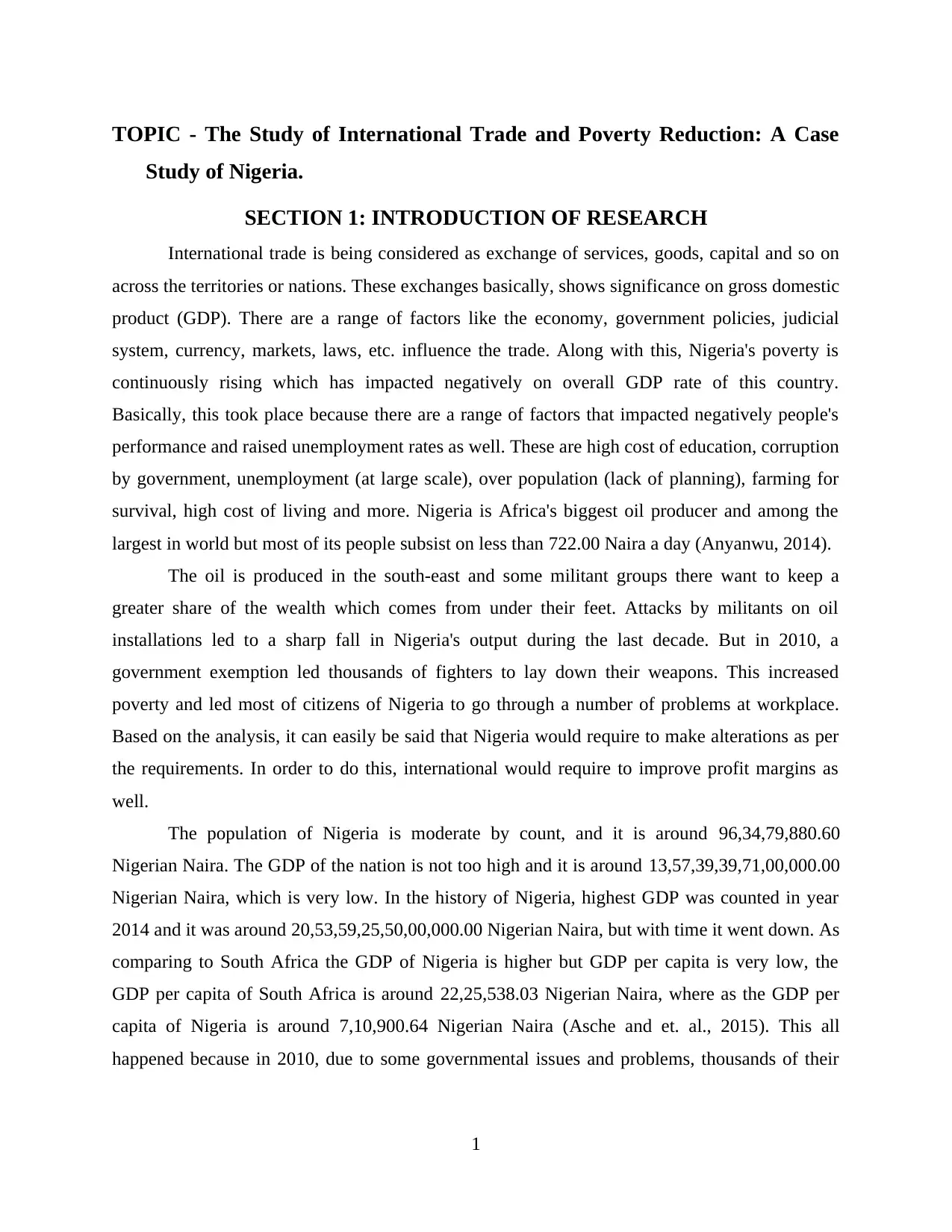
TOPIC - The Study of International Trade and Poverty Reduction: A Case
Study of Nigeria.
SECTION 1: INTRODUCTION OF RESEARCH
International trade is being considered as exchange of services, goods, capital and so on
across the territories or nations. These exchanges basically, shows significance on gross domestic
product (GDP). There are a range of factors like the economy, government policies, judicial
system, currency, markets, laws, etc. influence the trade. Along with this, Nigeria's poverty is
continuously rising which has impacted negatively on overall GDP rate of this country.
Basically, this took place because there are a range of factors that impacted negatively people's
performance and raised unemployment rates as well. These are high cost of education, corruption
by government, unemployment (at large scale), over population (lack of planning), farming for
survival, high cost of living and more. Nigeria is Africa's biggest oil producer and among the
largest in world but most of its people subsist on less than 722.00 Naira a day (Anyanwu, 2014).
The oil is produced in the south-east and some militant groups there want to keep a
greater share of the wealth which comes from under their feet. Attacks by militants on oil
installations led to a sharp fall in Nigeria's output during the last decade. But in 2010, a
government exemption led thousands of fighters to lay down their weapons. This increased
poverty and led most of citizens of Nigeria to go through a number of problems at workplace.
Based on the analysis, it can easily be said that Nigeria would require to make alterations as per
the requirements. In order to do this, international would require to improve profit margins as
well.
The population of Nigeria is moderate by count, and it is around 96,34,79,880.60
Nigerian Naira. The GDP of the nation is not too high and it is around 13,57,39,39,71,00,000.00
Nigerian Naira, which is very low. In the history of Nigeria, highest GDP was counted in year
2014 and it was around 20,53,59,25,50,00,000.00 Nigerian Naira, but with time it went down. As
comparing to South Africa the GDP of Nigeria is higher but GDP per capita is very low, the
GDP per capita of South Africa is around 22,25,538.03 Nigerian Naira, where as the GDP per
capita of Nigeria is around 7,10,900.64 Nigerian Naira (Asche and et. al., 2015). This all
happened because in 2010, due to some governmental issues and problems, thousands of their
1
Study of Nigeria.
SECTION 1: INTRODUCTION OF RESEARCH
International trade is being considered as exchange of services, goods, capital and so on
across the territories or nations. These exchanges basically, shows significance on gross domestic
product (GDP). There are a range of factors like the economy, government policies, judicial
system, currency, markets, laws, etc. influence the trade. Along with this, Nigeria's poverty is
continuously rising which has impacted negatively on overall GDP rate of this country.
Basically, this took place because there are a range of factors that impacted negatively people's
performance and raised unemployment rates as well. These are high cost of education, corruption
by government, unemployment (at large scale), over population (lack of planning), farming for
survival, high cost of living and more. Nigeria is Africa's biggest oil producer and among the
largest in world but most of its people subsist on less than 722.00 Naira a day (Anyanwu, 2014).
The oil is produced in the south-east and some militant groups there want to keep a
greater share of the wealth which comes from under their feet. Attacks by militants on oil
installations led to a sharp fall in Nigeria's output during the last decade. But in 2010, a
government exemption led thousands of fighters to lay down their weapons. This increased
poverty and led most of citizens of Nigeria to go through a number of problems at workplace.
Based on the analysis, it can easily be said that Nigeria would require to make alterations as per
the requirements. In order to do this, international would require to improve profit margins as
well.
The population of Nigeria is moderate by count, and it is around 96,34,79,880.60
Nigerian Naira. The GDP of the nation is not too high and it is around 13,57,39,39,71,00,000.00
Nigerian Naira, which is very low. In the history of Nigeria, highest GDP was counted in year
2014 and it was around 20,53,59,25,50,00,000.00 Nigerian Naira, but with time it went down. As
comparing to South Africa the GDP of Nigeria is higher but GDP per capita is very low, the
GDP per capita of South Africa is around 22,25,538.03 Nigerian Naira, where as the GDP per
capita of Nigeria is around 7,10,900.64 Nigerian Naira (Asche and et. al., 2015). This all
happened because in 2010, due to some governmental issues and problems, thousands of their
1
Paraphrase This Document
Need a fresh take? Get an instant paraphrase of this document with our AI Paraphraser
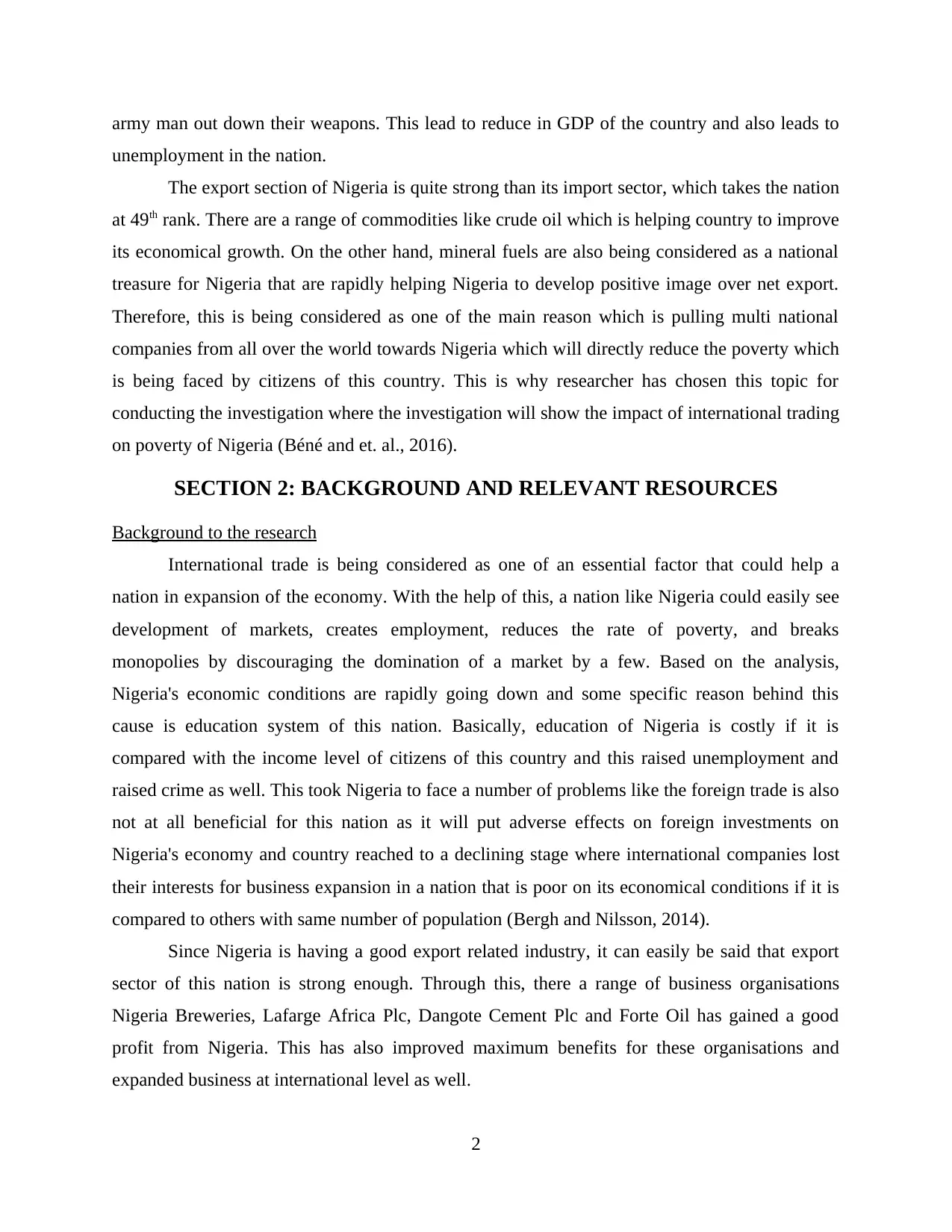
army man out down their weapons. This lead to reduce in GDP of the country and also leads to
unemployment in the nation.
The export section of Nigeria is quite strong than its import sector, which takes the nation
at 49th rank. There are a range of commodities like crude oil which is helping country to improve
its economical growth. On the other hand, mineral fuels are also being considered as a national
treasure for Nigeria that are rapidly helping Nigeria to develop positive image over net export.
Therefore, this is being considered as one of the main reason which is pulling multi national
companies from all over the world towards Nigeria which will directly reduce the poverty which
is being faced by citizens of this country. This is why researcher has chosen this topic for
conducting the investigation where the investigation will show the impact of international trading
on poverty of Nigeria (Béné and et. al., 2016).
SECTION 2: BACKGROUND AND RELEVANT RESOURCES
Background to the research
International trade is being considered as one of an essential factor that could help a
nation in expansion of the economy. With the help of this, a nation like Nigeria could easily see
development of markets, creates employment, reduces the rate of poverty, and breaks
monopolies by discouraging the domination of a market by a few. Based on the analysis,
Nigeria's economic conditions are rapidly going down and some specific reason behind this
cause is education system of this nation. Basically, education of Nigeria is costly if it is
compared with the income level of citizens of this country and this raised unemployment and
raised crime as well. This took Nigeria to face a number of problems like the foreign trade is also
not at all beneficial for this nation as it will put adverse effects on foreign investments on
Nigeria's economy and country reached to a declining stage where international companies lost
their interests for business expansion in a nation that is poor on its economical conditions if it is
compared to others with same number of population (Bergh and Nilsson, 2014).
Since Nigeria is having a good export related industry, it can easily be said that export
sector of this nation is strong enough. Through this, there a range of business organisations
Nigeria Breweries, Lafarge Africa Plc, Dangote Cement Plc and Forte Oil has gained a good
profit from Nigeria. This has also improved maximum benefits for these organisations and
expanded business at international level as well.
2
unemployment in the nation.
The export section of Nigeria is quite strong than its import sector, which takes the nation
at 49th rank. There are a range of commodities like crude oil which is helping country to improve
its economical growth. On the other hand, mineral fuels are also being considered as a national
treasure for Nigeria that are rapidly helping Nigeria to develop positive image over net export.
Therefore, this is being considered as one of the main reason which is pulling multi national
companies from all over the world towards Nigeria which will directly reduce the poverty which
is being faced by citizens of this country. This is why researcher has chosen this topic for
conducting the investigation where the investigation will show the impact of international trading
on poverty of Nigeria (Béné and et. al., 2016).
SECTION 2: BACKGROUND AND RELEVANT RESOURCES
Background to the research
International trade is being considered as one of an essential factor that could help a
nation in expansion of the economy. With the help of this, a nation like Nigeria could easily see
development of markets, creates employment, reduces the rate of poverty, and breaks
monopolies by discouraging the domination of a market by a few. Based on the analysis,
Nigeria's economic conditions are rapidly going down and some specific reason behind this
cause is education system of this nation. Basically, education of Nigeria is costly if it is
compared with the income level of citizens of this country and this raised unemployment and
raised crime as well. This took Nigeria to face a number of problems like the foreign trade is also
not at all beneficial for this nation as it will put adverse effects on foreign investments on
Nigeria's economy and country reached to a declining stage where international companies lost
their interests for business expansion in a nation that is poor on its economical conditions if it is
compared to others with same number of population (Bergh and Nilsson, 2014).
Since Nigeria is having a good export related industry, it can easily be said that export
sector of this nation is strong enough. Through this, there a range of business organisations
Nigeria Breweries, Lafarge Africa Plc, Dangote Cement Plc and Forte Oil has gained a good
profit from Nigeria. This has also improved maximum benefits for these organisations and
expanded business at international level as well.
2
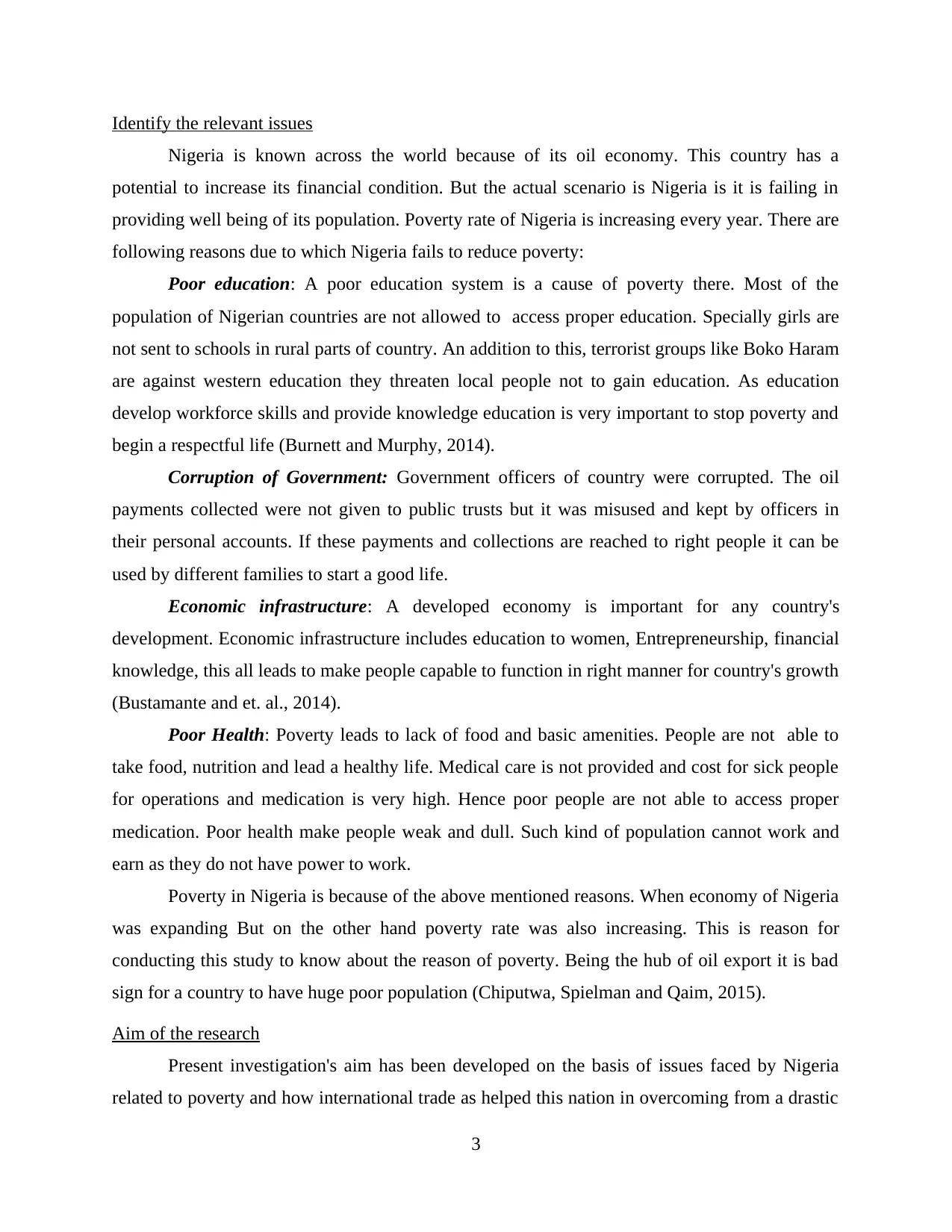
Identify the relevant issues
Nigeria is known across the world because of its oil economy. This country has a
potential to increase its financial condition. But the actual scenario is Nigeria is it is failing in
providing well being of its population. Poverty rate of Nigeria is increasing every year. There are
following reasons due to which Nigeria fails to reduce poverty:
Poor education: A poor education system is a cause of poverty there. Most of the
population of Nigerian countries are not allowed to access proper education. Specially girls are
not sent to schools in rural parts of country. An addition to this, terrorist groups like Boko Haram
are against western education they threaten local people not to gain education. As education
develop workforce skills and provide knowledge education is very important to stop poverty and
begin a respectful life (Burnett and Murphy, 2014).
Corruption of Government: Government officers of country were corrupted. The oil
payments collected were not given to public trusts but it was misused and kept by officers in
their personal accounts. If these payments and collections are reached to right people it can be
used by different families to start a good life.
Economic infrastructure: A developed economy is important for any country's
development. Economic infrastructure includes education to women, Entrepreneurship, financial
knowledge, this all leads to make people capable to function in right manner for country's growth
(Bustamante and et. al., 2014).
Poor Health: Poverty leads to lack of food and basic amenities. People are not able to
take food, nutrition and lead a healthy life. Medical care is not provided and cost for sick people
for operations and medication is very high. Hence poor people are not able to access proper
medication. Poor health make people weak and dull. Such kind of population cannot work and
earn as they do not have power to work.
Poverty in Nigeria is because of the above mentioned reasons. When economy of Nigeria
was expanding But on the other hand poverty rate was also increasing. This is reason for
conducting this study to know about the reason of poverty. Being the hub of oil export it is bad
sign for a country to have huge poor population (Chiputwa, Spielman and Qaim, 2015).
Aim of the research
Present investigation's aim has been developed on the basis of issues faced by Nigeria
related to poverty and how international trade as helped this nation in overcoming from a drastic
3
Nigeria is known across the world because of its oil economy. This country has a
potential to increase its financial condition. But the actual scenario is Nigeria is it is failing in
providing well being of its population. Poverty rate of Nigeria is increasing every year. There are
following reasons due to which Nigeria fails to reduce poverty:
Poor education: A poor education system is a cause of poverty there. Most of the
population of Nigerian countries are not allowed to access proper education. Specially girls are
not sent to schools in rural parts of country. An addition to this, terrorist groups like Boko Haram
are against western education they threaten local people not to gain education. As education
develop workforce skills and provide knowledge education is very important to stop poverty and
begin a respectful life (Burnett and Murphy, 2014).
Corruption of Government: Government officers of country were corrupted. The oil
payments collected were not given to public trusts but it was misused and kept by officers in
their personal accounts. If these payments and collections are reached to right people it can be
used by different families to start a good life.
Economic infrastructure: A developed economy is important for any country's
development. Economic infrastructure includes education to women, Entrepreneurship, financial
knowledge, this all leads to make people capable to function in right manner for country's growth
(Bustamante and et. al., 2014).
Poor Health: Poverty leads to lack of food and basic amenities. People are not able to
take food, nutrition and lead a healthy life. Medical care is not provided and cost for sick people
for operations and medication is very high. Hence poor people are not able to access proper
medication. Poor health make people weak and dull. Such kind of population cannot work and
earn as they do not have power to work.
Poverty in Nigeria is because of the above mentioned reasons. When economy of Nigeria
was expanding But on the other hand poverty rate was also increasing. This is reason for
conducting this study to know about the reason of poverty. Being the hub of oil export it is bad
sign for a country to have huge poor population (Chiputwa, Spielman and Qaim, 2015).
Aim of the research
Present investigation's aim has been developed on the basis of issues faced by Nigeria
related to poverty and how international trade as helped this nation in overcoming from a drastic
3
⊘ This is a preview!⊘
Do you want full access?
Subscribe today to unlock all pages.

Trusted by 1+ million students worldwide
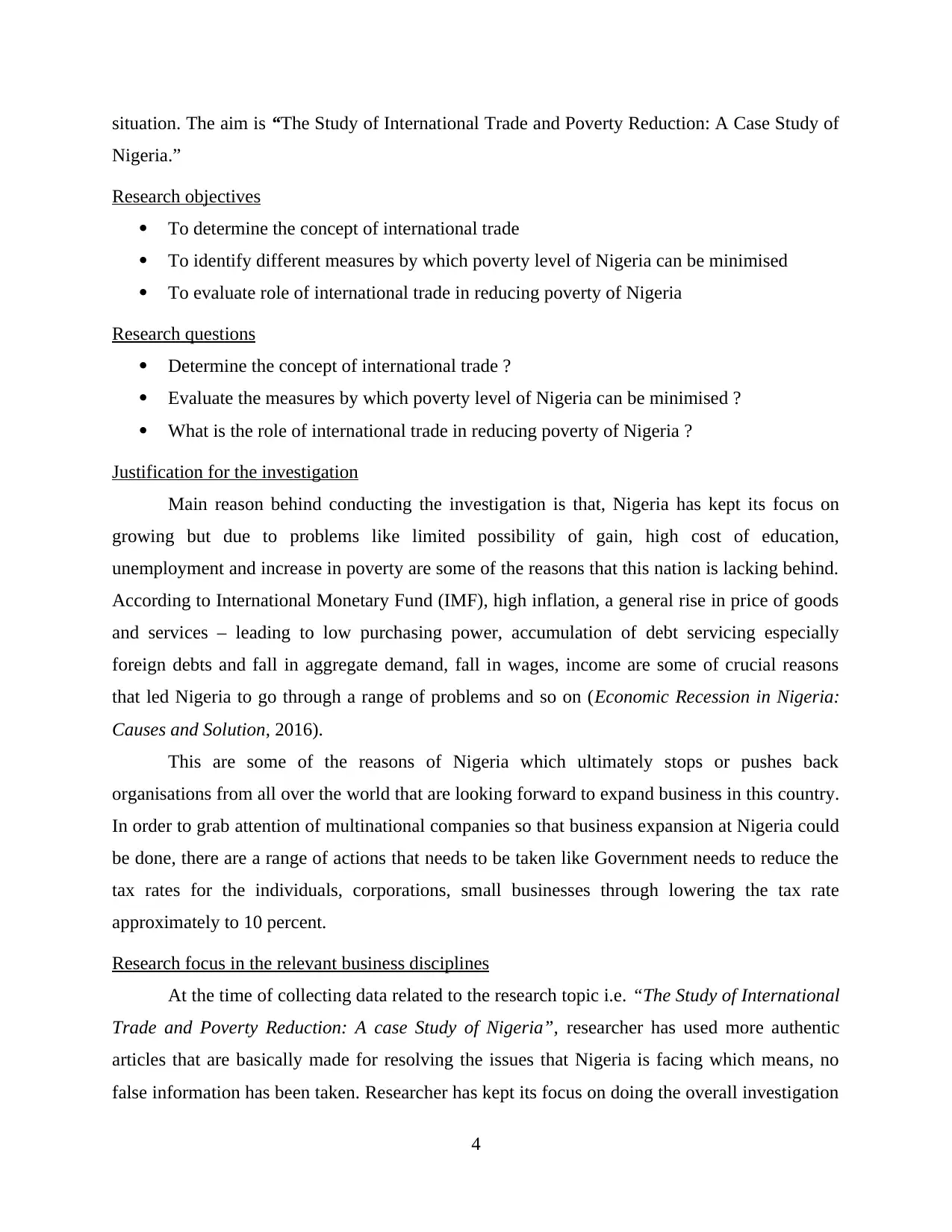
situation. The aim is “The Study of International Trade and Poverty Reduction: A Case Study of
Nigeria.”
Research objectives
To determine the concept of international trade
To identify different measures by which poverty level of Nigeria can be minimised
To evaluate role of international trade in reducing poverty of Nigeria
Research questions
Determine the concept of international trade ?
Evaluate the measures by which poverty level of Nigeria can be minimised ?
What is the role of international trade in reducing poverty of Nigeria ?
Justification for the investigation
Main reason behind conducting the investigation is that, Nigeria has kept its focus on
growing but due to problems like limited possibility of gain, high cost of education,
unemployment and increase in poverty are some of the reasons that this nation is lacking behind.
According to International Monetary Fund (IMF), high inflation, a general rise in price of goods
and services – leading to low purchasing power, accumulation of debt servicing especially
foreign debts and fall in aggregate demand, fall in wages, income are some of crucial reasons
that led Nigeria to go through a range of problems and so on (Economic Recession in Nigeria:
Causes and Solution, 2016).
This are some of the reasons of Nigeria which ultimately stops or pushes back
organisations from all over the world that are looking forward to expand business in this country.
In order to grab attention of multinational companies so that business expansion at Nigeria could
be done, there are a range of actions that needs to be taken like Government needs to reduce the
tax rates for the individuals, corporations, small businesses through lowering the tax rate
approximately to 10 percent.
Research focus in the relevant business disciplines
At the time of collecting data related to the research topic i.e. “The Study of International
Trade and Poverty Reduction: A case Study of Nigeria”, researcher has used more authentic
articles that are basically made for resolving the issues that Nigeria is facing which means, no
false information has been taken. Researcher has kept its focus on doing the overall investigation
4
Nigeria.”
Research objectives
To determine the concept of international trade
To identify different measures by which poverty level of Nigeria can be minimised
To evaluate role of international trade in reducing poverty of Nigeria
Research questions
Determine the concept of international trade ?
Evaluate the measures by which poverty level of Nigeria can be minimised ?
What is the role of international trade in reducing poverty of Nigeria ?
Justification for the investigation
Main reason behind conducting the investigation is that, Nigeria has kept its focus on
growing but due to problems like limited possibility of gain, high cost of education,
unemployment and increase in poverty are some of the reasons that this nation is lacking behind.
According to International Monetary Fund (IMF), high inflation, a general rise in price of goods
and services – leading to low purchasing power, accumulation of debt servicing especially
foreign debts and fall in aggregate demand, fall in wages, income are some of crucial reasons
that led Nigeria to go through a range of problems and so on (Economic Recession in Nigeria:
Causes and Solution, 2016).
This are some of the reasons of Nigeria which ultimately stops or pushes back
organisations from all over the world that are looking forward to expand business in this country.
In order to grab attention of multinational companies so that business expansion at Nigeria could
be done, there are a range of actions that needs to be taken like Government needs to reduce the
tax rates for the individuals, corporations, small businesses through lowering the tax rate
approximately to 10 percent.
Research focus in the relevant business disciplines
At the time of collecting data related to the research topic i.e. “The Study of International
Trade and Poverty Reduction: A case Study of Nigeria”, researcher has used more authentic
articles that are basically made for resolving the issues that Nigeria is facing which means, no
false information has been taken. Researcher has kept its focus on doing the overall investigation
4
Paraphrase This Document
Need a fresh take? Get an instant paraphrase of this document with our AI Paraphraser
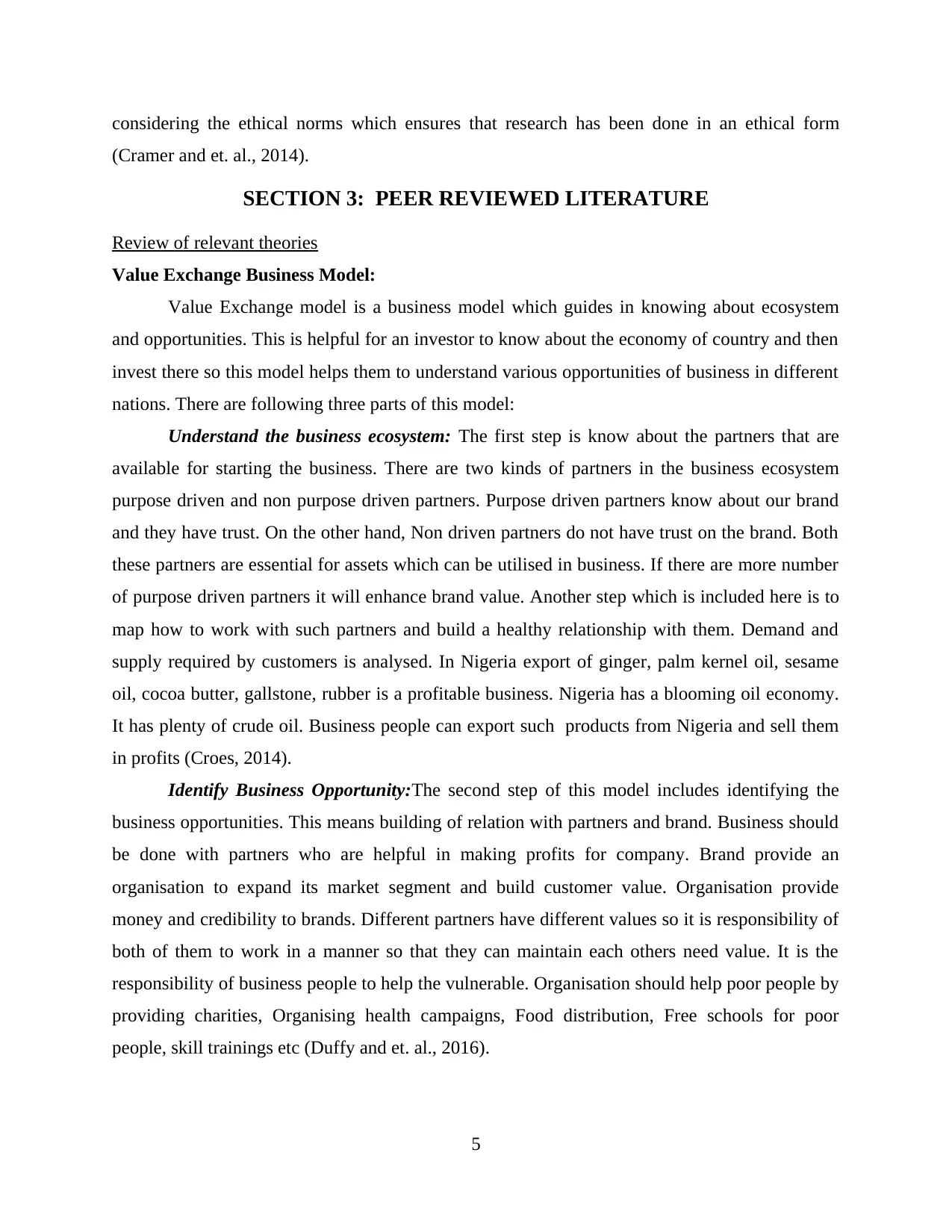
considering the ethical norms which ensures that research has been done in an ethical form
(Cramer and et. al., 2014).
SECTION 3: PEER REVIEWED LITERATURE
Review of relevant theories
Value Exchange Business Model:
Value Exchange model is a business model which guides in knowing about ecosystem
and opportunities. This is helpful for an investor to know about the economy of country and then
invest there so this model helps them to understand various opportunities of business in different
nations. There are following three parts of this model:
Understand the business ecosystem: The first step is know about the partners that are
available for starting the business. There are two kinds of partners in the business ecosystem
purpose driven and non purpose driven partners. Purpose driven partners know about our brand
and they have trust. On the other hand, Non driven partners do not have trust on the brand. Both
these partners are essential for assets which can be utilised in business. If there are more number
of purpose driven partners it will enhance brand value. Another step which is included here is to
map how to work with such partners and build a healthy relationship with them. Demand and
supply required by customers is analysed. In Nigeria export of ginger, palm kernel oil, sesame
oil, cocoa butter, gallstone, rubber is a profitable business. Nigeria has a blooming oil economy.
It has plenty of crude oil. Business people can export such products from Nigeria and sell them
in profits (Croes, 2014).
Identify Business Opportunity:The second step of this model includes identifying the
business opportunities. This means building of relation with partners and brand. Business should
be done with partners who are helpful in making profits for company. Brand provide an
organisation to expand its market segment and build customer value. Organisation provide
money and credibility to brands. Different partners have different values so it is responsibility of
both of them to work in a manner so that they can maintain each others need value. It is the
responsibility of business people to help the vulnerable. Organisation should help poor people by
providing charities, Organising health campaigns, Food distribution, Free schools for poor
people, skill trainings etc (Duffy and et. al., 2016).
5
(Cramer and et. al., 2014).
SECTION 3: PEER REVIEWED LITERATURE
Review of relevant theories
Value Exchange Business Model:
Value Exchange model is a business model which guides in knowing about ecosystem
and opportunities. This is helpful for an investor to know about the economy of country and then
invest there so this model helps them to understand various opportunities of business in different
nations. There are following three parts of this model:
Understand the business ecosystem: The first step is know about the partners that are
available for starting the business. There are two kinds of partners in the business ecosystem
purpose driven and non purpose driven partners. Purpose driven partners know about our brand
and they have trust. On the other hand, Non driven partners do not have trust on the brand. Both
these partners are essential for assets which can be utilised in business. If there are more number
of purpose driven partners it will enhance brand value. Another step which is included here is to
map how to work with such partners and build a healthy relationship with them. Demand and
supply required by customers is analysed. In Nigeria export of ginger, palm kernel oil, sesame
oil, cocoa butter, gallstone, rubber is a profitable business. Nigeria has a blooming oil economy.
It has plenty of crude oil. Business people can export such products from Nigeria and sell them
in profits (Croes, 2014).
Identify Business Opportunity:The second step of this model includes identifying the
business opportunities. This means building of relation with partners and brand. Business should
be done with partners who are helpful in making profits for company. Brand provide an
organisation to expand its market segment and build customer value. Organisation provide
money and credibility to brands. Different partners have different values so it is responsibility of
both of them to work in a manner so that they can maintain each others need value. It is the
responsibility of business people to help the vulnerable. Organisation should help poor people by
providing charities, Organising health campaigns, Food distribution, Free schools for poor
people, skill trainings etc (Duffy and et. al., 2016).
5
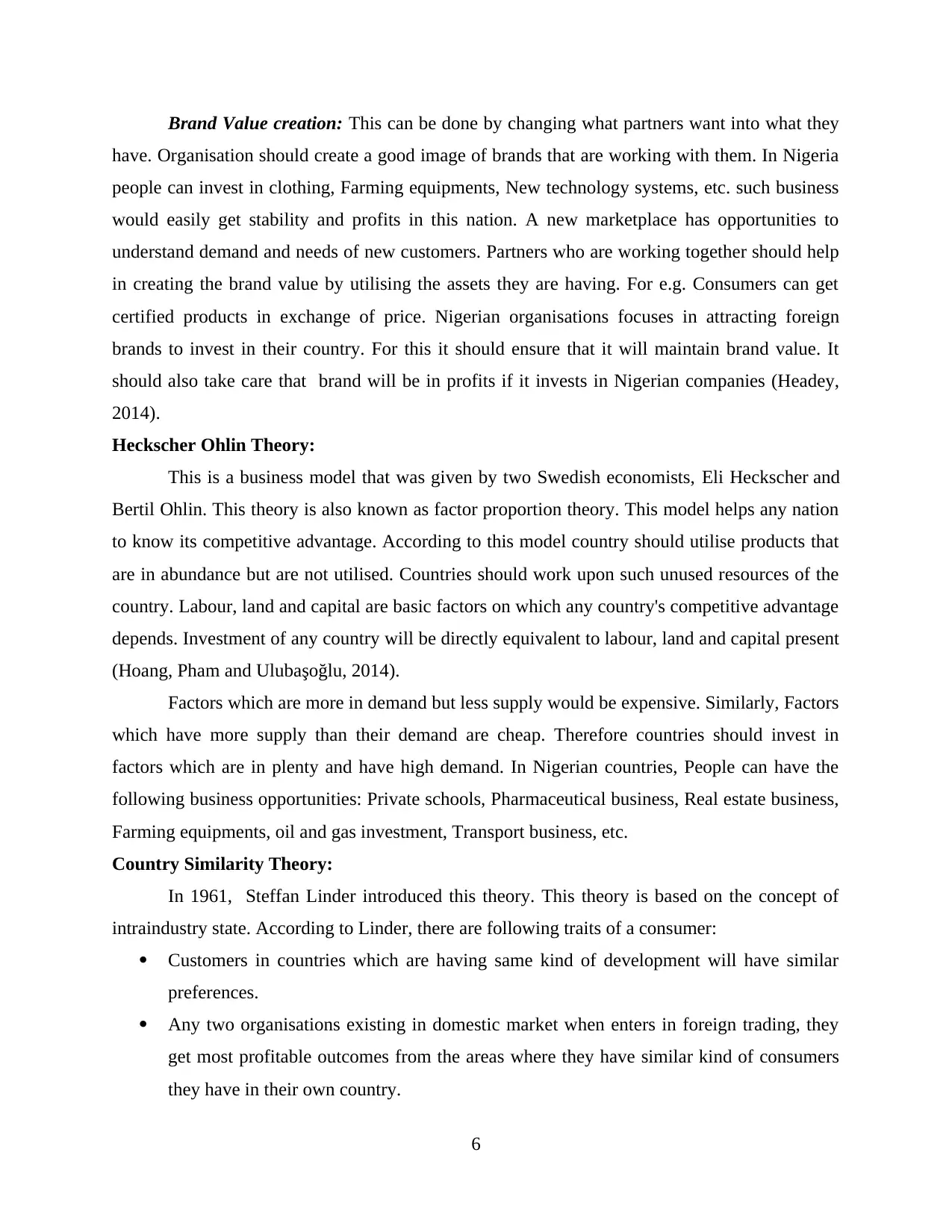
Brand Value creation: This can be done by changing what partners want into what they
have. Organisation should create a good image of brands that are working with them. In Nigeria
people can invest in clothing, Farming equipments, New technology systems, etc. such business
would easily get stability and profits in this nation. A new marketplace has opportunities to
understand demand and needs of new customers. Partners who are working together should help
in creating the brand value by utilising the assets they are having. For e.g. Consumers can get
certified products in exchange of price. Nigerian organisations focuses in attracting foreign
brands to invest in their country. For this it should ensure that it will maintain brand value. It
should also take care that brand will be in profits if it invests in Nigerian companies (Headey,
2014).
Heckscher Ohlin Theory:
This is a business model that was given by two Swedish economists, Eli Heckscher and
Bertil Ohlin. This theory is also known as factor proportion theory. This model helps any nation
to know its competitive advantage. According to this model country should utilise products that
are in abundance but are not utilised. Countries should work upon such unused resources of the
country. Labour, land and capital are basic factors on which any country's competitive advantage
depends. Investment of any country will be directly equivalent to labour, land and capital present
(Hoang, Pham and Ulubaşoğlu, 2014).
Factors which are more in demand but less supply would be expensive. Similarly, Factors
which have more supply than their demand are cheap. Therefore countries should invest in
factors which are in plenty and have high demand. In Nigerian countries, People can have the
following business opportunities: Private schools, Pharmaceutical business, Real estate business,
Farming equipments, oil and gas investment, Transport business, etc.
Country Similarity Theory:
In 1961, Steffan Linder introduced this theory. This theory is based on the concept of
intraindustry state. According to Linder, there are following traits of a consumer:
Customers in countries which are having same kind of development will have similar
preferences.
Any two organisations existing in domestic market when enters in foreign trading, they
get most profitable outcomes from the areas where they have similar kind of consumers
they have in their own country.
6
have. Organisation should create a good image of brands that are working with them. In Nigeria
people can invest in clothing, Farming equipments, New technology systems, etc. such business
would easily get stability and profits in this nation. A new marketplace has opportunities to
understand demand and needs of new customers. Partners who are working together should help
in creating the brand value by utilising the assets they are having. For e.g. Consumers can get
certified products in exchange of price. Nigerian organisations focuses in attracting foreign
brands to invest in their country. For this it should ensure that it will maintain brand value. It
should also take care that brand will be in profits if it invests in Nigerian companies (Headey,
2014).
Heckscher Ohlin Theory:
This is a business model that was given by two Swedish economists, Eli Heckscher and
Bertil Ohlin. This theory is also known as factor proportion theory. This model helps any nation
to know its competitive advantage. According to this model country should utilise products that
are in abundance but are not utilised. Countries should work upon such unused resources of the
country. Labour, land and capital are basic factors on which any country's competitive advantage
depends. Investment of any country will be directly equivalent to labour, land and capital present
(Hoang, Pham and Ulubaşoğlu, 2014).
Factors which are more in demand but less supply would be expensive. Similarly, Factors
which have more supply than their demand are cheap. Therefore countries should invest in
factors which are in plenty and have high demand. In Nigerian countries, People can have the
following business opportunities: Private schools, Pharmaceutical business, Real estate business,
Farming equipments, oil and gas investment, Transport business, etc.
Country Similarity Theory:
In 1961, Steffan Linder introduced this theory. This theory is based on the concept of
intraindustry state. According to Linder, there are following traits of a consumer:
Customers in countries which are having same kind of development will have similar
preferences.
Any two organisations existing in domestic market when enters in foreign trading, they
get most profitable outcomes from the areas where they have similar kind of consumers
they have in their own country.
6
⊘ This is a preview!⊘
Do you want full access?
Subscribe today to unlock all pages.

Trusted by 1+ million students worldwide
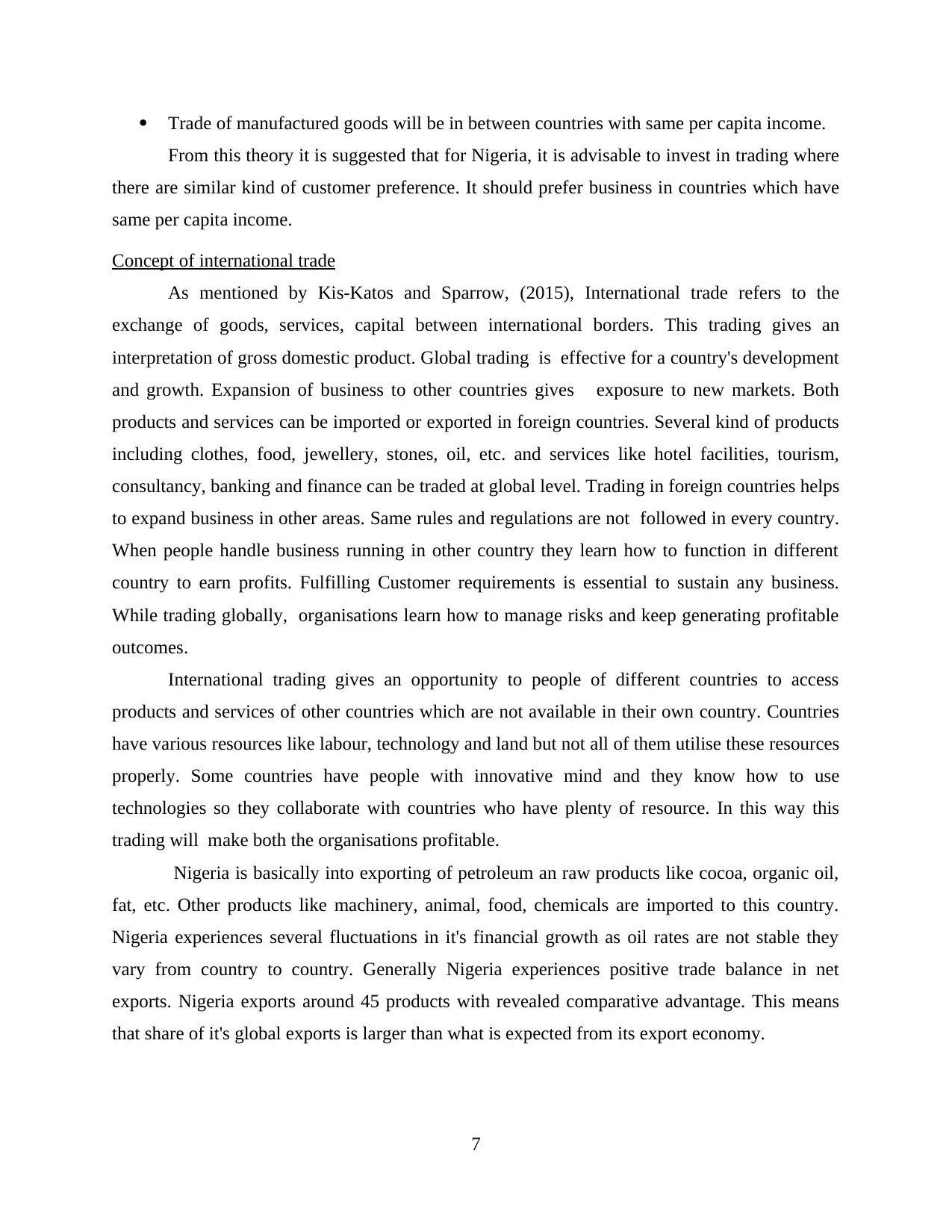
Trade of manufactured goods will be in between countries with same per capita income.
From this theory it is suggested that for Nigeria, it is advisable to invest in trading where
there are similar kind of customer preference. It should prefer business in countries which have
same per capita income.
Concept of international trade
As mentioned by Kis-Katos and Sparrow, (2015), International trade refers to the
exchange of goods, services, capital between international borders. This trading gives an
interpretation of gross domestic product. Global trading is effective for a country's development
and growth. Expansion of business to other countries gives exposure to new markets. Both
products and services can be imported or exported in foreign countries. Several kind of products
including clothes, food, jewellery, stones, oil, etc. and services like hotel facilities, tourism,
consultancy, banking and finance can be traded at global level. Trading in foreign countries helps
to expand business in other areas. Same rules and regulations are not followed in every country.
When people handle business running in other country they learn how to function in different
country to earn profits. Fulfilling Customer requirements is essential to sustain any business.
While trading globally, organisations learn how to manage risks and keep generating profitable
outcomes.
International trading gives an opportunity to people of different countries to access
products and services of other countries which are not available in their own country. Countries
have various resources like labour, technology and land but not all of them utilise these resources
properly. Some countries have people with innovative mind and they know how to use
technologies so they collaborate with countries who have plenty of resource. In this way this
trading will make both the organisations profitable.
Nigeria is basically into exporting of petroleum an raw products like cocoa, organic oil,
fat, etc. Other products like machinery, animal, food, chemicals are imported to this country.
Nigeria experiences several fluctuations in it's financial growth as oil rates are not stable they
vary from country to country. Generally Nigeria experiences positive trade balance in net
exports. Nigeria exports around 45 products with revealed comparative advantage. This means
that share of it's global exports is larger than what is expected from its export economy.
7
From this theory it is suggested that for Nigeria, it is advisable to invest in trading where
there are similar kind of customer preference. It should prefer business in countries which have
same per capita income.
Concept of international trade
As mentioned by Kis-Katos and Sparrow, (2015), International trade refers to the
exchange of goods, services, capital between international borders. This trading gives an
interpretation of gross domestic product. Global trading is effective for a country's development
and growth. Expansion of business to other countries gives exposure to new markets. Both
products and services can be imported or exported in foreign countries. Several kind of products
including clothes, food, jewellery, stones, oil, etc. and services like hotel facilities, tourism,
consultancy, banking and finance can be traded at global level. Trading in foreign countries helps
to expand business in other areas. Same rules and regulations are not followed in every country.
When people handle business running in other country they learn how to function in different
country to earn profits. Fulfilling Customer requirements is essential to sustain any business.
While trading globally, organisations learn how to manage risks and keep generating profitable
outcomes.
International trading gives an opportunity to people of different countries to access
products and services of other countries which are not available in their own country. Countries
have various resources like labour, technology and land but not all of them utilise these resources
properly. Some countries have people with innovative mind and they know how to use
technologies so they collaborate with countries who have plenty of resource. In this way this
trading will make both the organisations profitable.
Nigeria is basically into exporting of petroleum an raw products like cocoa, organic oil,
fat, etc. Other products like machinery, animal, food, chemicals are imported to this country.
Nigeria experiences several fluctuations in it's financial growth as oil rates are not stable they
vary from country to country. Generally Nigeria experiences positive trade balance in net
exports. Nigeria exports around 45 products with revealed comparative advantage. This means
that share of it's global exports is larger than what is expected from its export economy.
7
Paraphrase This Document
Need a fresh take? Get an instant paraphrase of this document with our AI Paraphraser
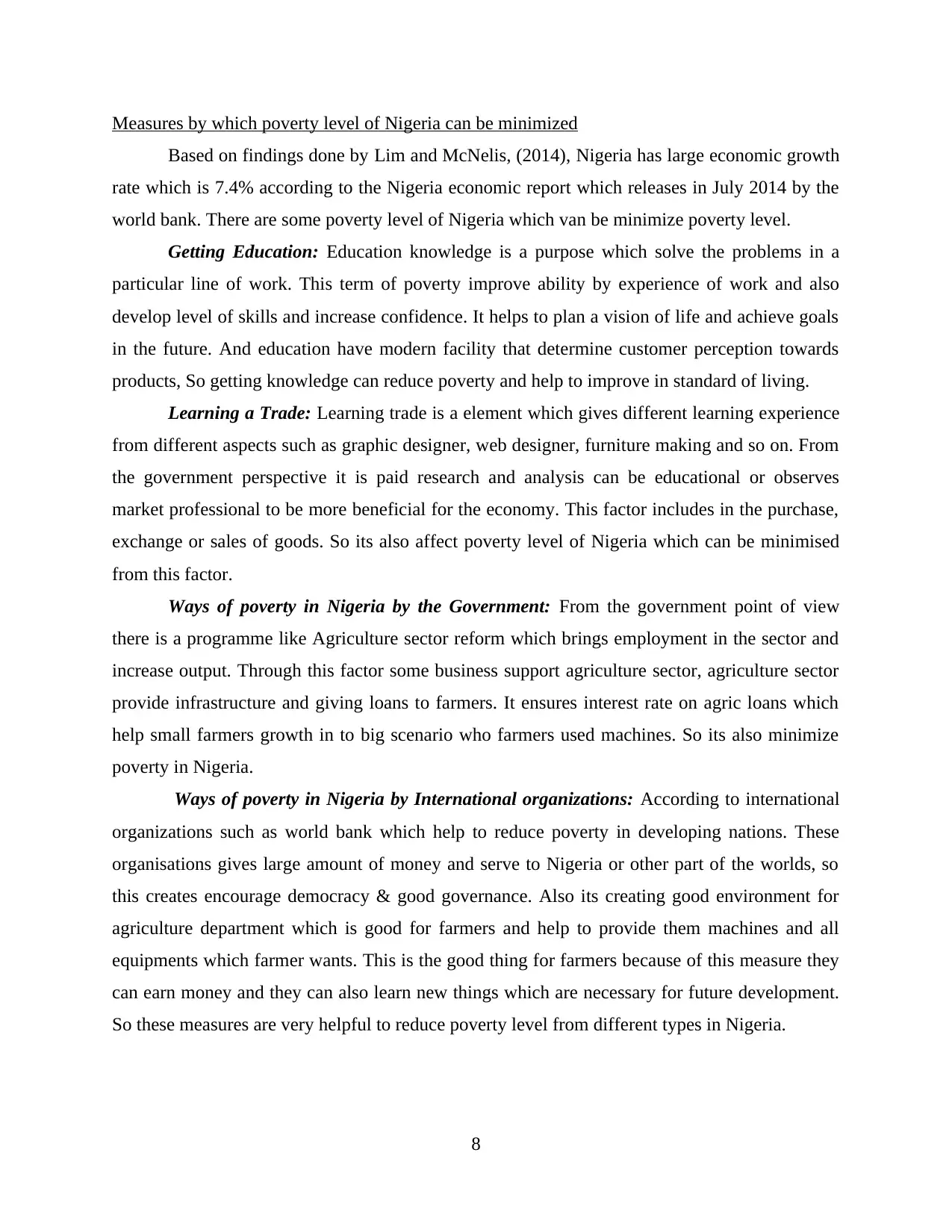
Measures by which poverty level of Nigeria can be minimized
Based on findings done by Lim and McNelis, (2014), Nigeria has large economic growth
rate which is 7.4% according to the Nigeria economic report which releases in July 2014 by the
world bank. There are some poverty level of Nigeria which van be minimize poverty level.
Getting Education: Education knowledge is a purpose which solve the problems in a
particular line of work. This term of poverty improve ability by experience of work and also
develop level of skills and increase confidence. It helps to plan a vision of life and achieve goals
in the future. And education have modern facility that determine customer perception towards
products, So getting knowledge can reduce poverty and help to improve in standard of living.
Learning a Trade: Learning trade is a element which gives different learning experience
from different aspects such as graphic designer, web designer, furniture making and so on. From
the government perspective it is paid research and analysis can be educational or observes
market professional to be more beneficial for the economy. This factor includes in the purchase,
exchange or sales of goods. So its also affect poverty level of Nigeria which can be minimised
from this factor.
Ways of poverty in Nigeria by the Government: From the government point of view
there is a programme like Agriculture sector reform which brings employment in the sector and
increase output. Through this factor some business support agriculture sector, agriculture sector
provide infrastructure and giving loans to farmers. It ensures interest rate on agric loans which
help small farmers growth in to big scenario who farmers used machines. So its also minimize
poverty in Nigeria.
Ways of poverty in Nigeria by International organizations: According to international
organizations such as world bank which help to reduce poverty in developing nations. These
organisations gives large amount of money and serve to Nigeria or other part of the worlds, so
this creates encourage democracy & good governance. Also its creating good environment for
agriculture department which is good for farmers and help to provide them machines and all
equipments which farmer wants. This is the good thing for farmers because of this measure they
can earn money and they can also learn new things which are necessary for future development.
So these measures are very helpful to reduce poverty level from different types in Nigeria.
8
Based on findings done by Lim and McNelis, (2014), Nigeria has large economic growth
rate which is 7.4% according to the Nigeria economic report which releases in July 2014 by the
world bank. There are some poverty level of Nigeria which van be minimize poverty level.
Getting Education: Education knowledge is a purpose which solve the problems in a
particular line of work. This term of poverty improve ability by experience of work and also
develop level of skills and increase confidence. It helps to plan a vision of life and achieve goals
in the future. And education have modern facility that determine customer perception towards
products, So getting knowledge can reduce poverty and help to improve in standard of living.
Learning a Trade: Learning trade is a element which gives different learning experience
from different aspects such as graphic designer, web designer, furniture making and so on. From
the government perspective it is paid research and analysis can be educational or observes
market professional to be more beneficial for the economy. This factor includes in the purchase,
exchange or sales of goods. So its also affect poverty level of Nigeria which can be minimised
from this factor.
Ways of poverty in Nigeria by the Government: From the government point of view
there is a programme like Agriculture sector reform which brings employment in the sector and
increase output. Through this factor some business support agriculture sector, agriculture sector
provide infrastructure and giving loans to farmers. It ensures interest rate on agric loans which
help small farmers growth in to big scenario who farmers used machines. So its also minimize
poverty in Nigeria.
Ways of poverty in Nigeria by International organizations: According to international
organizations such as world bank which help to reduce poverty in developing nations. These
organisations gives large amount of money and serve to Nigeria or other part of the worlds, so
this creates encourage democracy & good governance. Also its creating good environment for
agriculture department which is good for farmers and help to provide them machines and all
equipments which farmer wants. This is the good thing for farmers because of this measure they
can earn money and they can also learn new things which are necessary for future development.
So these measures are very helpful to reduce poverty level from different types in Nigeria.
8
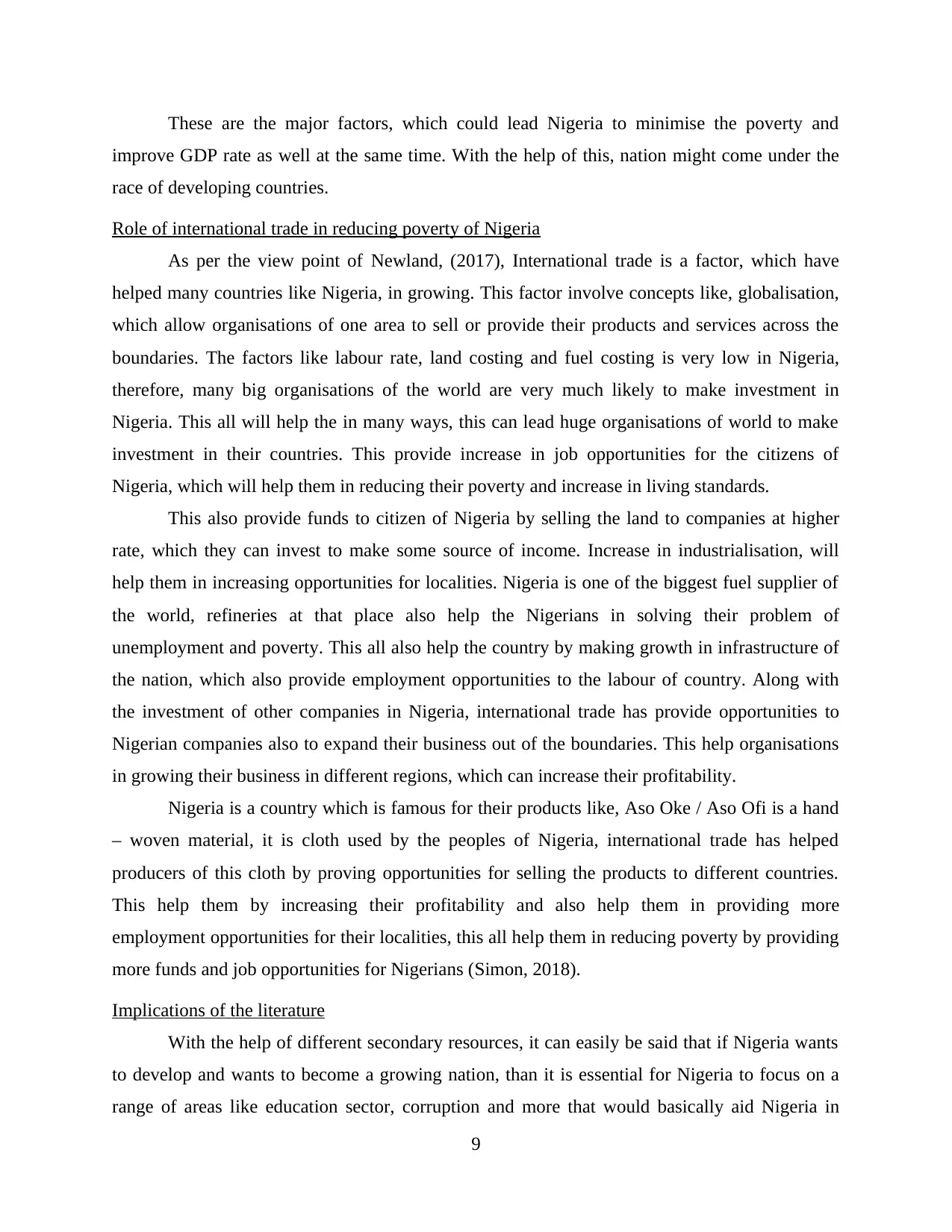
These are the major factors, which could lead Nigeria to minimise the poverty and
improve GDP rate as well at the same time. With the help of this, nation might come under the
race of developing countries.
Role of international trade in reducing poverty of Nigeria
As per the view point of Newland, (2017), International trade is a factor, which have
helped many countries like Nigeria, in growing. This factor involve concepts like, globalisation,
which allow organisations of one area to sell or provide their products and services across the
boundaries. The factors like labour rate, land costing and fuel costing is very low in Nigeria,
therefore, many big organisations of the world are very much likely to make investment in
Nigeria. This all will help the in many ways, this can lead huge organisations of world to make
investment in their countries. This provide increase in job opportunities for the citizens of
Nigeria, which will help them in reducing their poverty and increase in living standards.
This also provide funds to citizen of Nigeria by selling the land to companies at higher
rate, which they can invest to make some source of income. Increase in industrialisation, will
help them in increasing opportunities for localities. Nigeria is one of the biggest fuel supplier of
the world, refineries at that place also help the Nigerians in solving their problem of
unemployment and poverty. This all also help the country by making growth in infrastructure of
the nation, which also provide employment opportunities to the labour of country. Along with
the investment of other companies in Nigeria, international trade has provide opportunities to
Nigerian companies also to expand their business out of the boundaries. This help organisations
in growing their business in different regions, which can increase their profitability.
Nigeria is a country which is famous for their products like, Aso Oke / Aso Ofi is a hand
– woven material, it is cloth used by the peoples of Nigeria, international trade has helped
producers of this cloth by proving opportunities for selling the products to different countries.
This help them by increasing their profitability and also help them in providing more
employment opportunities for their localities, this all help them in reducing poverty by providing
more funds and job opportunities for Nigerians (Simon, 2018).
Implications of the literature
With the help of different secondary resources, it can easily be said that if Nigeria wants
to develop and wants to become a growing nation, than it is essential for Nigeria to focus on a
range of areas like education sector, corruption and more that would basically aid Nigeria in
9
improve GDP rate as well at the same time. With the help of this, nation might come under the
race of developing countries.
Role of international trade in reducing poverty of Nigeria
As per the view point of Newland, (2017), International trade is a factor, which have
helped many countries like Nigeria, in growing. This factor involve concepts like, globalisation,
which allow organisations of one area to sell or provide their products and services across the
boundaries. The factors like labour rate, land costing and fuel costing is very low in Nigeria,
therefore, many big organisations of the world are very much likely to make investment in
Nigeria. This all will help the in many ways, this can lead huge organisations of world to make
investment in their countries. This provide increase in job opportunities for the citizens of
Nigeria, which will help them in reducing their poverty and increase in living standards.
This also provide funds to citizen of Nigeria by selling the land to companies at higher
rate, which they can invest to make some source of income. Increase in industrialisation, will
help them in increasing opportunities for localities. Nigeria is one of the biggest fuel supplier of
the world, refineries at that place also help the Nigerians in solving their problem of
unemployment and poverty. This all also help the country by making growth in infrastructure of
the nation, which also provide employment opportunities to the labour of country. Along with
the investment of other companies in Nigeria, international trade has provide opportunities to
Nigerian companies also to expand their business out of the boundaries. This help organisations
in growing their business in different regions, which can increase their profitability.
Nigeria is a country which is famous for their products like, Aso Oke / Aso Ofi is a hand
– woven material, it is cloth used by the peoples of Nigeria, international trade has helped
producers of this cloth by proving opportunities for selling the products to different countries.
This help them by increasing their profitability and also help them in providing more
employment opportunities for their localities, this all help them in reducing poverty by providing
more funds and job opportunities for Nigerians (Simon, 2018).
Implications of the literature
With the help of different secondary resources, it can easily be said that if Nigeria wants
to develop and wants to become a growing nation, than it is essential for Nigeria to focus on a
range of areas like education sector, corruption and more that would basically aid Nigeria in
9
⊘ This is a preview!⊘
Do you want full access?
Subscribe today to unlock all pages.

Trusted by 1+ million students worldwide
1 out of 16
Related Documents
Your All-in-One AI-Powered Toolkit for Academic Success.
+13062052269
info@desklib.com
Available 24*7 on WhatsApp / Email
![[object Object]](/_next/static/media/star-bottom.7253800d.svg)
Unlock your academic potential
Copyright © 2020–2026 A2Z Services. All Rights Reserved. Developed and managed by ZUCOL.




